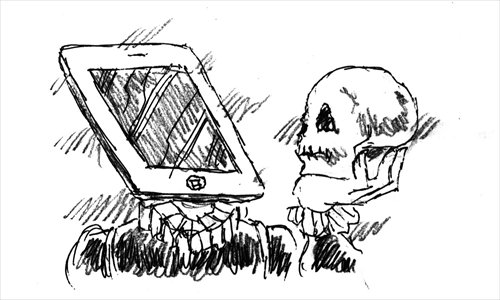Holding up a Black Mirror to our soul

A popular television show to garner much critical acclaim in China this year was the second season of Britdrama series Black Mirror. Written by all round misanthrope, satirist and critic Charlie Brooker, the show is set in the not-too distant future and in a marginally alternative reality to our own.
The show's unrelated episodes discuss the potential and collective side effects of a technology obsessed society hell-bent on substituting interpersonal resonance and self-worth for the quick fix of instant communication or the entertainment equivalent of a baby panda sneezing for a split second on a YouTube video.
This "black mirror" refers to the reflections of us on the black screens of our forever-on-standby mobile phones, iPads and various screen devices.
It's easy to see why Black Mirror'shi-tech dystopian vignettes have struck a chord with Chinese youth. We've all seen the modern condition in full flow here: People in a group setting engaged with more pressing matters on their screens.
Of course this is not exclusively a Chinese phenomenon. Smart phone antics happen everywhere. But what is interesting is how Black Mirror-type moments are starting to happen in China on a more regular basis. That Chinese Web users are starting to comment and take note of these absurd moments says a lot about the appeal of a very British television satire.
On April 9 this year, one such "black mirror" media tailspin occurred when Offbeat China wrote a blog called 3D Titanic suggests stricter censorship: No 3D boobs for Chinese viewers. The story claimed that the censors at the State Administration of Radio, Film and Television were afraid that local men would literally reach out and try to fondle Kate Winslet's 3D breasts.
It seemed so outrageous but also believable enough for major media outlets to pick it up until it was established that it was unfounded and fake. The fast pace of the dissemination of information aided by people on networking sites was identical to a Chinese whisper mutation demonstrated in one episode of Black Mirror.
Another episode, White Bear, opens with a woman waking up in a chair suffering acute amnesia. The only difference between now and before is that now everyone is filming her on their cellphones. It turns out the woman is part of a large social experiment for the gratifying rewards of public entertainment.
This reminded me of a scene I witnessed in the middle of the Third Ring Road this past winter. A younger man was caught attempting to pickpocket someone. The middle-aged prey-turned-moral enforcer was containing his attacker on the dirty concrete. A crowd gathered to watch. Predictably, no one did anything.
Instead, three bystanders closely watched the debacle, commenting on what was unfolding before their very eyes but filming it on their mobiles. This was a very Black Mirror moment. I was no better. I watched for a while and then took a picture that I never posted for others' amusement on Facebook.
The popularity of Black Mirror in China is no surprise given the nature of the craziness we see here everyday. But the enjoyment of the convenience of technology means that young Chinese will have to accept these side effects lest we all become modern luddites smashing our iPhone 6s to the ground in mass gatherings. If that happened, I would probably film it on my iPhone 4 and post it up online as fake news. Have we all gone mad?